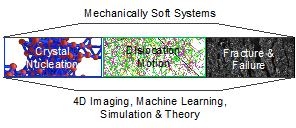IRG 2. Non-Equilibrium Phenomena in Mechanically Soft Systems
Lead: Frans Spaepen
Co-Lead: David R. Nelson
Primary Faculty Participants: Michael P. Brenner, Marine Denolle, Michele Holbrook, Boris Kozinsky, Zhigang Suo, Joost J. Vlassak, David A. Weitz, and George M. Whitesides
Secondary Participants: Lucy J. Colwell (Cambridge University/Google), Daan Frenkel (Cambridge University), Jennifer A. Lewis (Harvard), and James R. Rice (Harvard)


This IRG is pursuing new insights into the behavior of mechanically soft systems that are subjected to perturbations far from equilibrium. By combining data-rich experiments, theory, and artificial intelligence, the research will contribute greatly to NSF's 10 Big Ideas: Harnessing the Data Revolution by expanding its application to soft materials. While our focus is on soft materials, the insights gained will be broadly applicable to other classes of materials, spanning a wide range of length and time scales.
To carry out the research, we bring together a multidisciplinary research team composed of faculty members from applied mathematics, biology, physics, chemistry, earth and planetary science, soft matter physics, and mechanical engineering with deep expertise in soft materials assembly (Lewis, Weitz, Whitesides), fracture mechanics (Holbrook, Rice, Suo), 4D confocal imaging and materials characterization (Spaepen, Vlassak), machine learning and computer simulation (Brenner, Colwell, Denolle, Frenkel, Kozinsky), and theory (Nelson) to focus on three goals that exploit data-driven science (Figure 1).
- Understand crystal nucleation in single and multi-component hard-sphere systems and use the knowledge gained to develop new routes for creating alloys.
- Investigate collective dislocation motion that underlies plastic deformation of materials.
- Explore fracture phenomena in mechanically soft systems to understand their toughening, dissipation, and failure mechanisms.
